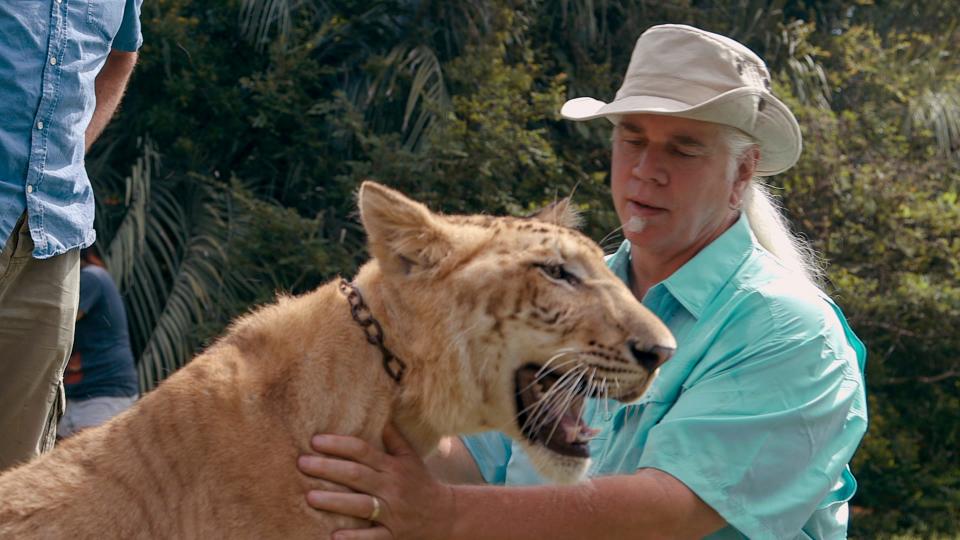'Tiger King' star pleads guilty to conspiring to money laundering, breaking federal law
Bhagavan “Doc” Antle, a safari owner and wildcat enthusiast in South Carolina, pleaded guilty Monday to federal conspiracy and money laundering charges, three years after he rose to fame in Netflix's infamous "Tiger King" docuseries.
Antle, 63, pleaded guilty to a conspiracy to violate the Lacey Act and a conspiracy to launder money, the United States Department of Justice said in a news release.
U.S. District Judge Joseph Dawson III for the District of South Carolina, who accepted Antle’s guilty plea, said he will sentence Antle after receiving and reviewing a sentencing report prepared by the U.S. Probation Office.
Antle faces a maximum penalty of five years in prison, a fine of up to $250,000 and three years of supervised release for each count.
“The defendant held himself out as a conservationist, yet repeatedly violated laws protecting endangered animals and then tried to cover up those violations,” Assistant Attorney General Todd Kim of the Justice Department’s Environment and Natural Resources Division said in a statement. “This prosecution demonstrates our commitment to combatting illegal trafficking, which threatens the survival of endangered animals.”

Tiger King: 'Doc' Antle banned from dealing in exotic animals for 5 years in Virginia
New York: Long Island man charged with smuggling $200,000 worth of dead bugs, butterflies
Violations under the Lacey Act
Prosecutors said that Antle conspired to violate the Lacey Act, which prohibits trafficking of illegally taken wildlife, fish or plants, between September 2018 and May 2020 by directing the sale or purchase of two cheetah cubs, two lion cubs, two tigers and one juvenile chimpanzee – all of which are protected under the Endangered Species Act.
The Department of Justice said that Antle used "bulk cash payments to hide the transactions" and tampered with the paperwork to show non-commercial transfers. The news release further said that the safari park owner also requested payments for endangered species to be made to his nonprofit so they could appear as “donations.”

Money laundering
Government investigators also uncovered evidence of money laundering between February and April 2022, when Antle and a co-conspirator conducted financial transactions with cash they believed was obtained from transporting and harboring illegal aliens.
"To conceal and disguise the nature of the illegal cash, Antle and his co-conspirator would take the cash they received and deposit it into bank accounts they controlled," said the news release. "They would then write a check to the individual that had provided the cash after taking a 15% fee per transaction."
Assistant Director Edward Grace of the U.S. Fish and Wildlife Service, Office of Law Enforcement said that "wildlife crime is often connected with other criminal activity, including money-laundering" and that his office is committed to holding those in wildlife trafficking accountable.
Illegal wildlife trading: Where do trafficked animals go after they're rescued? This network could be the answer
T.I.G.E.R.S
Antle, is the owner and operator of The Institute for Greatly Endangered and Rare Species (T.I.G.E.R.S.), also known as the Myrtle Beach Safari, a 50-acre wildlife tropical preserve that offers tours and private encounters with exotic wildlife. He is also the Director of the Rare Species Fund, a nonprofit organization registered in South Carolina.
Antle rose to prominence in "Tiger King: Murder, Mayhem and Madness," a 2020 Netflix documentary miniseries about tiger breeders and private zoo operators in the United States.
While Antle and his Myrtle Beach Safari park in South Carolina are featured in the series, the star was undoubtedly Joe Exotic, an eccentric zoo operator in Oklahoma who became caught up in a plot to kill Carole Baskin, a rival who operates an animal sanctuary in Florida.
Exotic — whose real name is Joseph Maldonado-Passage — is serving 21 years in federal prison after he was resentenced last year in the murder-for-hire case. The 60-year-old maintains his innocence and claims to have been set up.
Antle has for years come under fire by animal rights groups
Antle has for years found himself in the crosshairs of animal rights advocates, who have long accused him of mistreating lions and other wildlife.
In 1989, Antle's history of recorded violations began when he was fined by the U.S. Department of Agriculture for abandoning deer and peacocks at his zoo in Virginia. Over the years, he has more than 35 USDA violations for mistreating animals, according to the Associated Press.
Banned from owning wildlife in Virginia
Last month, a judge in Virginia banned Antle for five years from buying, owning and selling any exotic animals within the state after the wild animal trainer was convicted in June of illegally purchasing endangered lion cubs in Virginia. He also received a suspended two-year prison sentence and must pay fines totaling $10,000.
Contributing: Eric Lagatta, USA TODAY
Saman Shafiq is a trending news reporter for USA TODAY. Reach her at sshafiq@gannett.com and follow her on X, the platform formerly known as Twitter @saman_shafiq7.
This article originally appeared on USA TODAY: 'Tiger King's 'Doc' Antle guilty of money laundering, conspiracy


